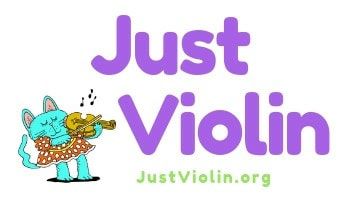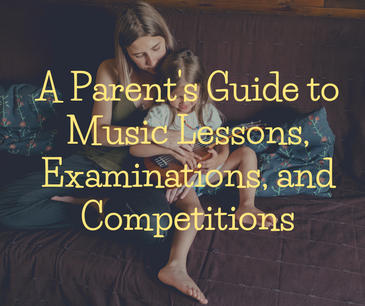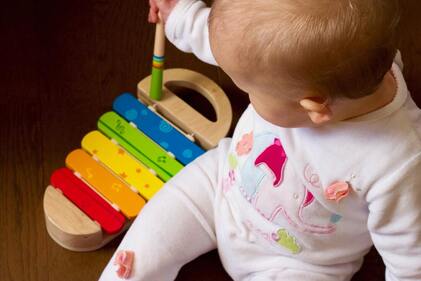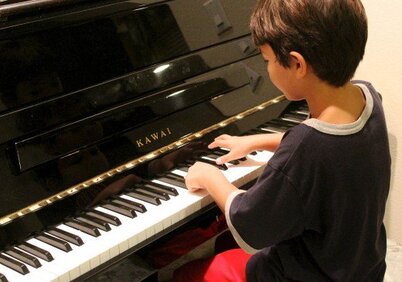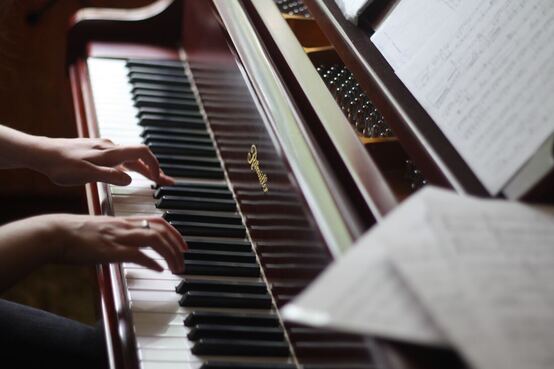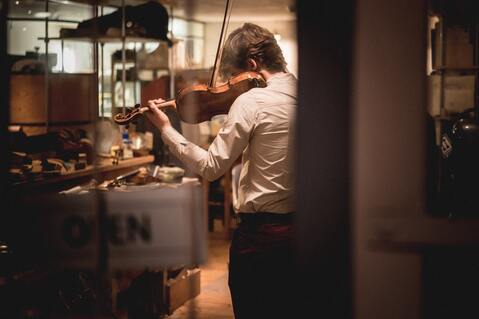A Parent's Guide to Music Lessons, Examinations, and Competitions
© Goh Tong Keat
|
|
Music Lesson: Things to Know
If you are a parent with no background in musical training, you may not know what to expect when you send your child to music lessons. We break the process down into three parts to help you with finding a good music teacher, enrolling your child into music lessons, and getting to know your responsibilities in your child's musical learning.
Finding A Good Music Teacher
Finding a good music teacher for your child is crucial. Music teachers do not necessarily have to be outstanding performers or composers themselves. Still, they must possess ample knowledge and understanding in their respective fields, along with experience in teaching and playing their instruments. They must also have the willingness and passion to share their expertise with the students.
To find the right music teacher, parents must first understand that music learning requires a great deal of time and effort. Apart from regular lessons, which are usually around thirty to sixty minutes a week, the students need to practice on their own throughout the week. Some parents enroll their children for music lessons to fill up the remaining slots of their hectic weekly schedules. In such cases, the children can rarely show meaningful progress in their musical learning regardless of how good the teachers are, simply because they have no time to practice. If they learn music the right way, there are more benefits to the children than just another hobby.
Once you have understood and accepted that music learning is a long process that takes time and effort, the next step is to get to know the teacher. There are various genres in music, and for example, classical pianists are trained very differently from jazz or contemporary pianists, even though both follow the same fundamentals of music and may practice the same technical etudes. If your child has the aspirations to play in a symphony orchestra, you may want to find a teacher who can guide him or her in that direction. Similarly, if your child is interested in contemporary music, he or she may not enjoy learning or practicing the classical repertoire. Being a versatile musician is undoubtedly a big plus point, but parents must first find a good starting point to stimulate their interests.
To find the right music teacher, parents must first understand that music learning requires a great deal of time and effort. Apart from regular lessons, which are usually around thirty to sixty minutes a week, the students need to practice on their own throughout the week. Some parents enroll their children for music lessons to fill up the remaining slots of their hectic weekly schedules. In such cases, the children can rarely show meaningful progress in their musical learning regardless of how good the teachers are, simply because they have no time to practice. If they learn music the right way, there are more benefits to the children than just another hobby.
Once you have understood and accepted that music learning is a long process that takes time and effort, the next step is to get to know the teacher. There are various genres in music, and for example, classical pianists are trained very differently from jazz or contemporary pianists, even though both follow the same fundamentals of music and may practice the same technical etudes. If your child has the aspirations to play in a symphony orchestra, you may want to find a teacher who can guide him or her in that direction. Similarly, if your child is interested in contemporary music, he or she may not enjoy learning or practicing the classical repertoire. Being a versatile musician is undoubtedly a big plus point, but parents must first find a good starting point to stimulate their interests.
Enrolling Your Child into Music Lessons
Each teacher and student is unique in their ways of teaching and learning. Some teachers are so stringent that their students must show measurable progress each week, while some are more flexible to allow for the natural development of the student's ability. Students also range from the very enthusiastic ones, to those who could not care less about their music lessons. As such, there is no such thing as the best music teacher, but it is crucial to find one that works well with your child.
Some music schools offer trial lessons so that you can decide if you want to enroll your child for the longer term. You should make good use of this opportunity to see if your child can willingly take instructions from the teacher. While modern parenting often talks about respecting the child's intention and giving them the freedom to choose, it is crucial to understand that for the very young children, the ultimate decision falls on the parents. It is the parents who decide whether or not to enroll their child for music lessons. Any experienced parent knows that young children can easily change their minds over time.
When you sign up for music lessons, you want to find out if the lessons are being conducted one-to-one, in a small group, or a large group. For instrumental lessons, many experts recommend that you sign up for individual lessons so that your child can get full attention from the teacher. The teacher can also teach with a method that works well for your child. However, some children may only respond well when there are peers around. In these cases, you may consider small group lessons of two to three students. Large group lessons, similarly to classroom teaching, usually happen in school settings for general music class rather than specialized instrumental training.
Some music schools offer trial lessons so that you can decide if you want to enroll your child for the longer term. You should make good use of this opportunity to see if your child can willingly take instructions from the teacher. While modern parenting often talks about respecting the child's intention and giving them the freedom to choose, it is crucial to understand that for the very young children, the ultimate decision falls on the parents. It is the parents who decide whether or not to enroll their child for music lessons. Any experienced parent knows that young children can easily change their minds over time.
When you sign up for music lessons, you want to find out if the lessons are being conducted one-to-one, in a small group, or a large group. For instrumental lessons, many experts recommend that you sign up for individual lessons so that your child can get full attention from the teacher. The teacher can also teach with a method that works well for your child. However, some children may only respond well when there are peers around. In these cases, you may consider small group lessons of two to three students. Large group lessons, similarly to classroom teaching, usually happen in school settings for general music class rather than specialized instrumental training.
Maintaining Interest in Music Learning
Once the child has started taking music lessons, the parents play an essential role in supporting and maintaining their interest, while at the same time, teaching them how to persevere through the tough times. Parents should often communicate with the teachers to be informed of their children's progress. However, being overly-anxious of their progress does not help either. Allow enough time for teachers and students to build trust and relationship, but do not be afraid to seek alternatives if the learning process has not been going well after a long period of time.
Parents are also responsible for motivating their children by acknowledging their achievements, no matter how trivial it may seem. Some parents were quick to jump to conclusions and classify their child as having no musical talent whenever the children struggled to learn something. Such behaviors are highly damaging to the child's self-esteem, and they will be afraid to try out new things when they grow up.
It is also advisable for parents to bring their children to music-related events. A great deal of learning happens outside the studio. Being actively involved in musical activities is especially important for students who may want to pursue tertiary education or career in music. Most of them felt overwhelmed or unprepared when they entered college because they lacked the exposure to what is happening outside of their regular weekly lessons. There are many events that can inspire them, such as music festivals, concerts, masterclasses, seminars, and workshops.
Parents are also responsible for motivating their children by acknowledging their achievements, no matter how trivial it may seem. Some parents were quick to jump to conclusions and classify their child as having no musical talent whenever the children struggled to learn something. Such behaviors are highly damaging to the child's self-esteem, and they will be afraid to try out new things when they grow up.
It is also advisable for parents to bring their children to music-related events. A great deal of learning happens outside the studio. Being actively involved in musical activities is especially important for students who may want to pursue tertiary education or career in music. Most of them felt overwhelmed or unprepared when they entered college because they lacked the exposure to what is happening outside of their regular weekly lessons. There are many events that can inspire them, such as music festivals, concerts, masterclasses, seminars, and workshops.
Music Examination: What the Fuss is All About
Two Differing Point of Views
Music educators have divided opinions on music examinations. Some people would not accept that music students need to take examinations. They see it as a vain attempt to judge a musician’s ability. When too much effort is spent on the exam and not on the music itself, the entire process of music-making becomes meaningless. When we make music for purposes other than artistic expression, it has strayed from the path of why music existed in the first place.
For other music educators who embraced examination, they see it as a structural way of teaching music. It serves as a guideline for teachers to plan for the long-term for each student, with the final goal of producing a well-rounded musician. By using the syllabus as a backdrop, the teachers will have a better sense of what are the strengths and weaknesses of each student.
For other music educators who embraced examination, they see it as a structural way of teaching music. It serves as a guideline for teachers to plan for the long-term for each student, with the final goal of producing a well-rounded musician. By using the syllabus as a backdrop, the teachers will have a better sense of what are the strengths and weaknesses of each student.
The Loopholes in Examination Syllabus
Examination boards like ABRSM and Trinity has over the years, grow in popularity in many countries. As music teachers, students, or parents, we need to understand how we can use examination as a tool to help us without hindering our musical expression. Occasionally we heard of a prodigious child who willingly practice for hours every day without being asked. However, for most children, they need motivation to practice. They need to know where they are coming from and where they are heading to in learning this instrument. A syllabus can help with that.
While comprehensive, a syllabus may overlook certain aspects, such as technical evaluations for instruments outside the examiner's expertise. This can lead to advanced-level candidates passing exams without a solid technical foundation, raising concerns about the legitimacy of these assessments and their readiness for conservatory or job auditions.
While comprehensive, a syllabus may overlook certain aspects, such as technical evaluations for instruments outside the examiner's expertise. This can lead to advanced-level candidates passing exams without a solid technical foundation, raising concerns about the legitimacy of these assessments and their readiness for conservatory or job auditions.
Exam is the Tool, Not the Curriculum
Undoubtedly, music examination is a lucrative business. The exam fee, when added to the already costly tuition for private music lessons will make some parents shudder. With the world starting to recognize the benefits of extra-curricular learning, the increasing demand for music certification will inevitably drive up the price, and in turn, the profit for the few elite institutions that offered it.
Coming back to what was said earlier, music examination is merely a learning tool; it is not the curriculum. There are no absolute pros and cons to it, but rather, how do you make sure that the time, effort, and money spent in the course of preparing for exams benefit your learning.
Coming back to what was said earlier, music examination is merely a learning tool; it is not the curriculum. There are no absolute pros and cons to it, but rather, how do you make sure that the time, effort, and money spent in the course of preparing for exams benefit your learning.
Music Competition: The Pros and The Cons
Every year, promising young musicians emerge as prize winners in major competitions around the world. These competitions allow their talent to be noticed, and subsequently bring in concert engagements and recording contracts. Some of these competitions have a long and prestigious history, while new competitions are also coming up in various parts of the world at different levels.
Is winning competitions the ultimate glory to a person's musical achievement, or is there another reason for us learn music?
Is winning competitions the ultimate glory to a person's musical achievement, or is there another reason for us learn music?
The Pros
Music competitions are a platform for talented musicians to get discovered. The internet has made things much more accessible, people around the world can watch the live streaming of a competition on Facebook or Youtube nowadays. Musicians who want to build their reputation can take advantage of social media to create a fan page and to engage with their followers. In short, technologies help you get noticed quickly by breaking down geographical barriers, but the condition is that you have to be good enough to stand out among competitors from around the world. The harsh reality is that technology disruptions in the entertainment business has directed more and more to the very top musicians, while leaving less and less for the rest.
On a broader level, competitive events tend to draw more attention. Music competitions has slowly become a significant part of the entertainment industry, where ticket proceeds and sponsorship bring in substantial revenue to sustain the industry. Some prestigious music competitions even become a tourism highlights for the cities they are held in, as they attract competitors and audience from all around the world.
On the personal level, young musicians who participate in music competitions gain valuable experience in meeting like-minded people and learning from each other. They also learn to deal with the pressure and anxiety of performing on stage in a competitive environment. Most prizewinners that you see did not just win the medal on the first time they enter a competition; they have put in a lot of hard work and endured plenty of failures before you see them in their glories.
On a broader level, competitive events tend to draw more attention. Music competitions has slowly become a significant part of the entertainment industry, where ticket proceeds and sponsorship bring in substantial revenue to sustain the industry. Some prestigious music competitions even become a tourism highlights for the cities they are held in, as they attract competitors and audience from all around the world.
On the personal level, young musicians who participate in music competitions gain valuable experience in meeting like-minded people and learning from each other. They also learn to deal with the pressure and anxiety of performing on stage in a competitive environment. Most prizewinners that you see did not just win the medal on the first time they enter a competition; they have put in a lot of hard work and endured plenty of failures before you see them in their glories.
The Cons
While there are many benefits to joining music competitions, music teachers must not lose sight of the real purpose of music learning. Paul Harris, in his book The Virtuoso Teacher, said that the job of a music teacher is to "guide each student in his/her way to acquire the ability and confidence to be involved in music-making independently." Shinichi Suzuki believed that his teaching was not to create virtuoso, but to develop human being with a good heart. Music competitions in essential, should be used only to enhance the entire learning experience, and not as a mean to an end itself.
From the artistic point of view, music competition poses another question. How do we measure artistry? I believe that the true essence of art lies in its individuality; however, in music competitions, we select a winner based on pre-set criteria, subject to the taste and judgment of the juries. It created a false impression where one artwork is superior to the others when, in fact, such measurements do not exist.
It is crucial to recognize that success in music goes beyond winning competitions, as many accomplished performers have never claimed competition prizes. Musicians are artists, and their creative journey should be driven by passion and individuality, rather than conforming to rigid systems. Embrace your uniqueness and strive to become the best musician you can be, staying true to your artistic vision and pursuing a path that resonates with your heart. Remember, the pursuit of music is not solely about accolades but about the fulfillment and joy that comes from expressing your artistic voice authentically.
From the artistic point of view, music competition poses another question. How do we measure artistry? I believe that the true essence of art lies in its individuality; however, in music competitions, we select a winner based on pre-set criteria, subject to the taste and judgment of the juries. It created a false impression where one artwork is superior to the others when, in fact, such measurements do not exist.
It is crucial to recognize that success in music goes beyond winning competitions, as many accomplished performers have never claimed competition prizes. Musicians are artists, and their creative journey should be driven by passion and individuality, rather than conforming to rigid systems. Embrace your uniqueness and strive to become the best musician you can be, staying true to your artistic vision and pursuing a path that resonates with your heart. Remember, the pursuit of music is not solely about accolades but about the fulfillment and joy that comes from expressing your artistic voice authentically.
